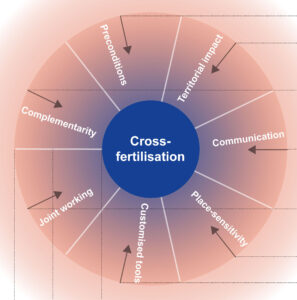
The ESPON policy brief ‘Cross-fertilisation of cohesion policy and spatial planning’, prepared by a team of researchers at SP&S, European Policies Research Centre (EPRC), and Czech University of Life Science, has just been published.
It is incumbent on governments at all levels to ensure that cohesion policy is efficient and helps deliver territorial cohesion. Spatial planning tools can play the key role in ensuring that in the countries and regions that receive cohesion policy funding the combined territorial impacts of cohesion policy and other sectoral policies are positive. However, the cross-fertilisation of cohesion policy and spatial planning is often very weak. Drawing on real experiences across Europe, this brief proposes seven practical steps that may enhance cross-fertilisation in the short term. They complement current trends and could guide and accelerate the achievement of a more territorially sensitive and efficient cohesion policy.
The brief draws on findings of the ESPON Comparative Analysis of Territorial Governance and Spatial Planning Systems in Europe (COMPASS) project on trends in spatial planning systems since 2000. Those findings have been deepened in 2021 in a follow-up project that examined the cross-fertilisation of cohesion policy and spatial planning through, first, a case study of practices in Czech Republic, and, second, a dialogue with experts across Europe on potential good practices.
The brief can be downloaded at: https://www.espon.eu/cohesion-policy-and-spatial-planning